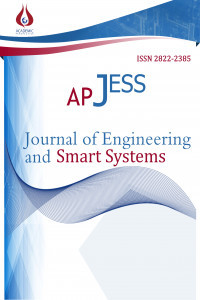Büyük Kağıt Rolelerinin Kesme Çizelgelemesi
Büyük rulo kesimi, sezgisel yaklaşımlar, çizelgeleme
Scheduling Cutting Process for Large Paper Rolls
Stock cutting problem, heuristic approaches, scheduling,
___
- Martinez-Alfaro, H., and Valenzuela-Rendon, M., ”Using Simulated Annealing with a Neighborhood Heuristic for Roll Cutting Optimization”, Computacin y Sistemas, 13(1), 87-95, (2009).
- Martinez-Alfaro, H., and Valenzuela-Rendon, M., ”Paper Cutting Optimization Using Simulated Annealing”, Proc. of IEEE International Conference on Systems, Man and Cybernetics, 3038-3043, (2003).
- Kolahan, F., and Abachizadeh, M., ”Optimizing Turning Parameters for Cylindrical PartsUsing Simulated Annealing Method”, International Journal of Engineering and Applied Sciences 6(3), 149-152, (2010).
- Kenyon, C., ”Best-fit bin-packing with random order”, Proc. of the 7th annual ACM-SIAM, (1996).
- Lodi, A., Martello, S., and Vigo, D., ”Recent advances on two-dimensional bin packing problems”, Discrete Applied Mathematics, 123(1-3), 379-396, (2002).
- Lodi, A., Martello, S., and Monaci, M., ”Two- dimensional packing problems: A survey”, European Journal of Operational Research, 141(2), 241-252, (2002).
- Sweeney, P. E. and Paternoster, E. R., ”Cutting and Packing Problems: A Categorized, Application- Orientated Research Bibliography”, The Journal of the Operational Research Society, 43(7), 691-706, (1992).
- Coffman Jr, E.G., Garey, M.R., Johnson, D.S., and Tarjan, R.E., ”Performance bounds for level- oriented two-dimensional packing algorithms”, SIAM Journal on Computing, 9, 808-826, (1980).
- Johnson, M. P., Rennick, C., and Zak, E., ”Skiving addition to the cutting stock problem in the paper industry”, SIAM Review, 39(3), 472-483,(Sep., 1997).
- Yayın Aralığı: Yılda 3 Sayı
- Başlangıç: 2022
- Yayıncı: Akademik Perspektif Derneği
Alan LİSİCA, Sabahudin JAAREVİC
Büyük Kağıt Rolelerinin Kesme Çizelgelemesi
Mehmet Emin AYDİN, Osman TAYLAN
Foto-Litografik Maskeler İçin Değişen MEMS Aynaları Üzerine Bir Derleme
Meslek Yüksekokullarında Nitelikli İşgücü Yetiştirmek için 3+1 Eğitim Modeli
Soğuk Gaz Dinamik Sprey (CGDS) Kaplama Teknolojisi ve Uygulamaları
Abdullah Cahit KARAOĞLANLI, Ahmet TÜRK, Fatih ÜSTEL
Neutron Shielding Properties Of Concrete With Boron And Boron Containing Mineral
